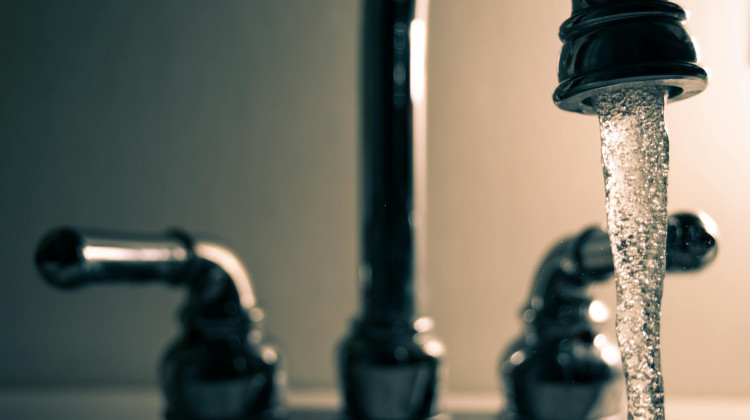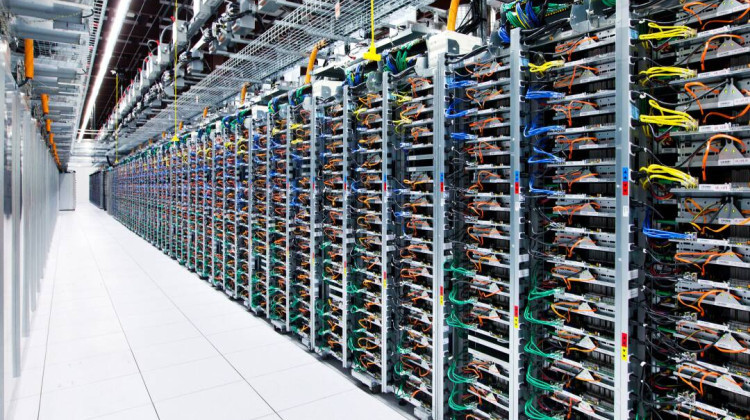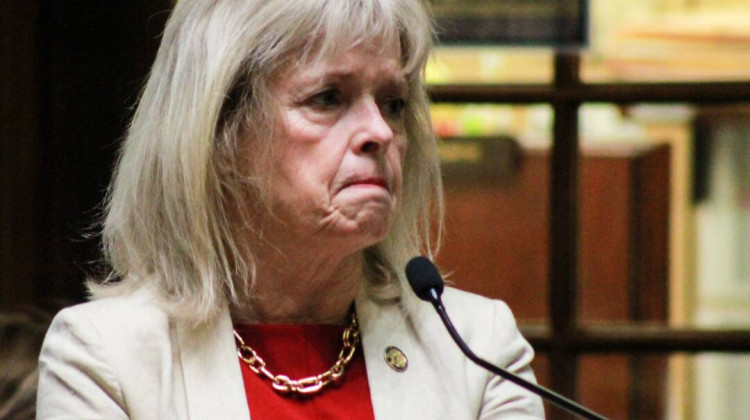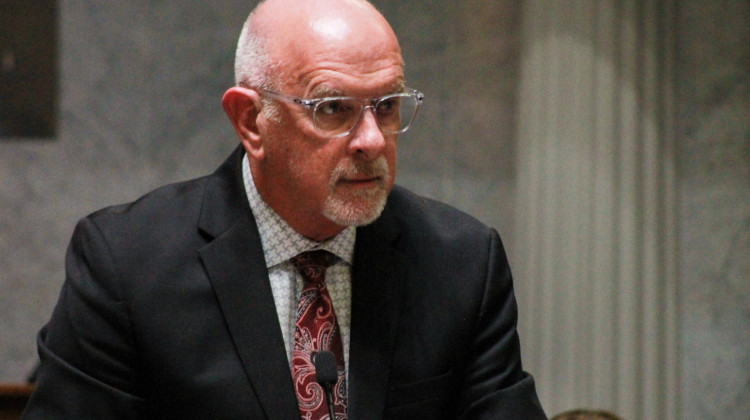
For decades, the Clean Water Act has helped clean up water sources across the country by setting water quality standards and regulating pollutant discharges into water bodies. That changed after the Sackett v. EPA ruling last year.
Steve Johnson / PexelsClimate change is altering the world as we know it. For example, it’s impacting our water. Many people think of heavier rainfall in some places and droughts in others. But did you know climate change can make our water less safe to use?
Lizzy McGrevy, Side Effects Public Media’s community engagement specialist, spoke with Health Reporter Elizabeth Gabriel to answer one question: How does climate change impact our water quality?
This transcript has been edited for length, style and clarity.
Lizzy McGrevy: So, I heard that waterborne pathogens cause over 100,000 hospitalizations every year in the United States. Can you talk a little about how climate change contributes to that?
Elizabeth Gabriel: There are a few main ways climate change impacts water quality. The first is through increased rainfall during extreme weather events. When there’s more rainwater than the ground can absorb, that leads to water runoff. That’s when excess water, especially in cities that don’t have as many grassy areas, collects pollutants as it flows down dirty city streets and yards with dog poop. And in cities with very outdated sewer systems, it can also cause toilet water to accumulate with that runoff. And all of those contaminants end up in water reservoirs that we rely on.
The second way climate change impacts water quality is an increase in temperature. Harmful bacteria like E. coli thrive in warm weather. It’s an issue for streams and rivers, but even more so for lakes and reservoirs. And not only does that make the water unsafe to come in contact with, it also makes it harder to refine it for drinking water.
McGrevy: Can you talk a little bit more about how this change in water quality gets people sick?
Gabriel: Sometimes people end up with symptoms similar to food poisoning — like vomiting and diarrhea.
Warmer temperatures have also led to an increase in algal blooms. The algal themselves are fine, but the toxins they secrete aren’t. And some dogs have gotten sick or even died after drinking that water.
In Toledo, Ohio, for example, more than 100 people got sick when there was algae in tap water about a decade ago.
And many people know that boiling water can make it safer to use, but actually, when it comes to algal blooms, boiling the water can make the toxins worse.
McGrevy: I know that tap water goes through various treatment systems — does this help?
Gabriel: Even if there’s a high level of these toxic organisms, depending on your location, water companies typically treat the water before the [algae] start producing actual toxins. But Indiana University’s environmental science professor Gabriel Filippelli said people should be worried about water that isn’t required to be tested by the county or state.
“There's a lot of people on wells and nobody tests their well water unless you choose to do it,” Fillippelli said. “And rarely do homeowners who have wells test it regularly. And so if the well is contaminated with bacteria or with other harmful things, you could be drinking it in well water and not even know.”
McGrevy: Water is essential for all lifeforms — humans, animals, plants, bugs. What are we doing to protect our precious water sources from climate change?
Gabriel: We both live in Indianapolis and you can tell, there’s a lot of construction. Some of that actually has to do with our sewer system.
The multi-service water utility company, Citizens Energy Group, is in charge of a sewer system improvement project that’s nearly two decades old. It’s called the DigIndy Tunnel System. The project isn’t finished yet, but they say it's already reduced the amount of harmful pollutants that are going into waterways. But some researchers say that even though it’s brand new, it won’t meet expectations.
They say when engineers planned this project, they calculated how big the tunnels should be based on recent rainwater data they had. Now, Filippelli at Indiana University doesn’t think the new tunnels are sustainable since engineers didn’t account for potential changes due to climate change.
“Climate change has already increased our flooding-type rainfall by about 15% over the last 20 years,” Fillippelli said. “And we anticipate, based on our modeling, that it'll continue on that trend and go up another 15% or so in the next 20 years.”
But Citizens Energy denies these claims. The consent decree between Citizens Energy and the Environmental Protection Agency requires them to build a tunnel system that can hold 250 million gallons of sewage per rain event. Mike Miller, manager for the DigIndy Tunnel System, said changes to the plans over the years should allow the tunnels to capture 280-290 million gallons.
“Unless the EPA came out with new regulations that required us to build beyond what we've already committed to, we will continue to monitor and modify and meet that criteria,” Miller said.
Miller said they will continue to conduct post-construction monitoring on the tunnels once they’re completely finished by the end of next year. They’ve already started some of the monitoring by doing real-time assessments that compare the tunnel’s collection rates to rainwater data from 2022-2023. But they currently don’t have plans to update or construct new tunnels beyond the current DigIndy project.
McGrevy: There have been some efforts to pressure states and the federal government into implementing climate change policies. Is it working?
Gabriel: The Biden administration has poured billions of dollars into trying to fix water sources near nature preserves and in urban areas. That includes efforts to improve water efficiency and climate resilience. But some Republican-led states have fought back against federal efforts to clean up municipal water supplies.
For decades, the Clean Water Act has helped clean up water sources across the country by setting water quality standards and regulating pollutant discharges into water bodies. That changed after the Sackett v. EPA ruling last year. That’s when the Supreme Court made a more restrictive definition of what qualifies as a water of the United States under the Clean Water Act. Now, developers can sidestep permits and regulations and states don’t have to clean up as many water sources.
Burke Griggs, a professor of law with Washburn University in Kansas, said Des Moines, Iowa could be used as an example. The city sued enormous pork and meat processing plants and the nearby farms that let tainted water flow downstream.
“You're downstream from 200 farms — all of which are polluting the river. But they're mostly exempt from the Clean Water Act,” Griggs said. “How do you hold them accountable?”
“The city of Des Moines could pass a municipal statute [or] regulation saying, ‘You can't pollute the water.’ Well, that raises all sorts of legal problems because under the Constitution, federal law is supreme to state law. So it's very hard for the states to regulate themselves out of this.”
McGrevy: It seems from what you’re saying that water quality problems are not going away. In fact, they will get worse by climate change, but the politics are so polarizing and it’s becoming harder to solve those problems. So, in the meantime, what can people like you and I do on an individual level to protect our water sources?
Gabriel: Griggs said people need to recognize the importance of civic and political engagement when it comes to water issues. Then, there is environmental justice. Many of the older water systems with lead pipes for example are located in poorer, Black and brown communities. But now, with gentrification and climate change, more affluent communities can also be impacted by poor water quality.
On a day-to-day basis, small actions can make a big impact, like picking up your dog poop, which is a huge source of E. coli. People should also be careful when doing an oil change on their car so the oil doesn’t leak onto someone's yard. Not fertilizing your yard also helps. But if you must, check the forecast and don’t do it if it’s going to rain the next few days. Otherwise, the rain will wash those chemicals into our storm drains and they’ll end up in the water system.
McGrevy: Thank you for the great information.
If you have any questions about our healthcare system, questions you’re too shy to ask your doctor, or other health questions, please reach out to us. We’ll be back with more health information at your next Checkup. Stay safe.
The Checkup by Side Effects Public Media is a regular audio segment that airs on the radio and on WFYI's daily podcast, WFYI News Now.
Contact WFYI’s health reporter Elizabeth Gabriel at egabriel@wfyi.org.
Side Effects Public Media is a health reporting collaboration based at WFYI in Indianapolis. We partner with NPR stations across the Midwest and surrounding areas — including KBIA and KCUR in Missouri, Iowa Public Radio, Ideastream in Ohio and WFPL in Kentucky.
 DONATE
DONATE






 Support WFYI. We can't do it without you.
Support WFYI. We can't do it without you.